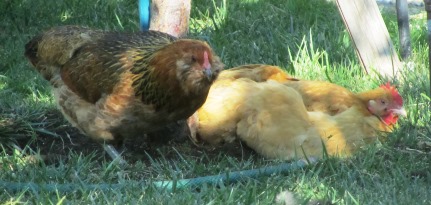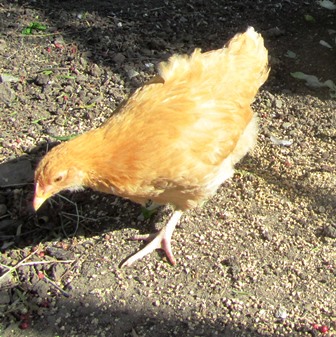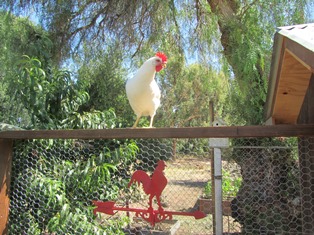Update on the Buffo Broodzilla
My Buff Orpington hen, who’d been sitting on a couple dozen infertile eggs for weeks–some rotten and others broken–finally left the nesting box after I removed all the eggs. I’ll be set up for baby chicks next year in my hen house, but not now.
At first, she continued to display her broodzilla behaviors (aggressive, flighty, angry) and was easily set off by the antics of the other chickens. However, within a day or two, she’d normalized her old laying routine and began running with the other hens as they foraged around the farmette, took dust baths, clamored for chicken snacks, and pecked at each other.
My neighbor told me to dunk her in cold water to break her broody cycle. That’s because hens who go broody have an elevated body temp. Removing the eggs worked this time; maybe next time, I’ll try cooling her off. Or . . . if it happens in the spring, I might get some baby chicks and let her raise them.
I’m certain there will be a next time–she’s gone broody three times in a year and half. Some hens have that tendency.
Big, Blonde Buff-O Goes on the Attack
The yellow-colored Buff Orpington hen seemed so cute when she was all down and a day old.
But six months have passed, the Buff-O has feathered out and gone broody. Today, she showed me a nasty-tempered, cranky hen, with ruffled feathers who will stop at nothing to hatch the clutch of eggs she’s sitting on.
The problem is that some of those eggs in the nesting box aren’t hers, and they’re all unfertilized since we have no rooster.

From left to right: Furry Face, the Ameracuana, and Buff-O, the Buff Orpington, when they used to sun themselves together
Buff-O has been sitting on the clutch of eggs for almost three weeks now, barely leaving to eat or drink. But today, she exited the hen house to take dirt bath–that’s how chickens clean themselves. Toss on the dirt, roll in it, then get up and shake like a dog, flinging the dirt in all directions as far as possible.
Before the fight started, all nine of my hens were foraging on our property, except for Buff-O and the shy Ameracauna with the furry face. The latter was in the chicken run, scratching the dirt, minding her own business.
I saw Buff-O walk over and lunge at Furry Face in attack mode. She used her beak to viciously peck Furry Face’s neck and her clawed toes to tear at the poor shy chicken’s back. She seemed more rooster than hen.
I ran for the hose and separated the two with a spray of water. Then, with both out of chicken run and into the yard, I gathered up all those unfertile, soon-to-be-rotten eggs that Buff-O has been trying in vain to hatch, and headed toward the garbage can.
But apparently, tossing those eggs changed nothing. Buff-O is back in the hen house on the nest–albeit, a different nesting box than before. But the straw in the original nesting box is still warm. It’s being occupied by Furry Face. Go figure!
A Broody Hen, A Clutch of Eggs, and No Rooster
My little yellow Buff Orpington {as yet unnamed) has gone broody. I didn’t know this behavior could happen so early in her young life. At 20 weeks, she’s only just started laying eggs. Now all she wants to do is sit on them.
Like an expectant mother, she contentedly sits, apparently anticipating the arrival of her chicklets (in 21 days). I don’t have the heart to tell her that she needed a rendezvous with a rooster to get eggs that will hatch. And, in case she hasn’t noticed, we don’t have a rooster.
She’s become a fixture on the nesting box, forcing the other chickens to lay their eggs in the other two. Buff O. sits on the eggs (who knows how many are under her) with a glazed look in her eyes. If I go near her nesting box, she puffs up and ruffles her feathers like an attack chicken.
She must leave the nest to eat, drink, and poop . . . . but I haven’t witnessed it, so I have put containers of food and water near the nest. I don’t want her losing weight or getting sick during her sit-in.
At first, sensing that she was behaving strangely and fearful that something be wrong with her, I began searching the Internet. Apparently some breeds like Silkies, and Cochins have a tendency to go broody. And, they can go broody more than once during the year. See, http://blog.mypetchicken.com/2012/02/01/what-is-a-broody-hen.
Apparently, dictated by their biology, laying hens decide to sit on a clutch of eggs, even rolling other chickens’ eggs under them if there aren’t enough. The laying hen will rotate her body to redirect heat evenly over the eggs or pluck out her own chest feathers to create more warmth and moisture for the eggs. In the case of my hen, I’m trying to imagine a bare-chested chicken sitting on a clutch of eggs that will never hatch.
Broody hens will even talk to the eggs (and the little chicks growing inside). It’s mommy business they are attending to. However, once a hen has gone broody, she will stop laying. And as for the mommy business, I have no idea how my Buff Orpington will figure out that those eggs she’s so carefully guarding . . . well, they’re just eggs.
They’re Ba-a-c-k!
The sound of the chickens squawking propelled me upright in bed. The sun wasn’t up yet but there was a ruckus going on in the chicken house. And it didn’t sound pretty.
I leaped from bed, staggered to the window, pulled up the blind, and looked out.
The foxes had returned. One stood on its hind legs, pawing at the double layer of poultry wire screwed over the open chicken window.
I yelled, “Get out of there!” hoping the fox would leave . . . but it didn’t. It just made the chickens squawk louder.
Throwing on my robe, I raced to the patio where my red, rubber (indestructible) clogs waited for my feet to slide in. Grabbing the broom and a two-by-four, I raced to the chicken house, yelling all the way.
This time the fox paid attention, but showed no interest in retreating. I waved the broom and pounded my board against the metal garbage can (in which I keep the 25-pound bags of chicken feed). The noise did the trick. Off went the fox to join the other two.
The three disappeared into the wooded acre of land behind our property. Finally, my chickens settled down. I let them out for the day. One deposited her egg–not in the nesting box–but on the ground, as if too freaked out to go back inside the hen house. Well, can you blame her?
 Facebook
Facebook Goodreads
Goodreads LinkedIn
LinkedIn Meera Lester
Meera Lester Twitter
Twitter







